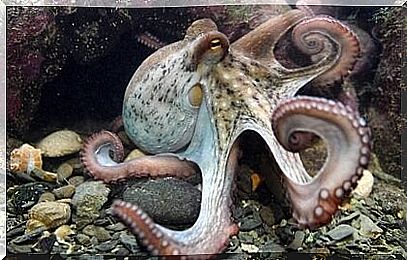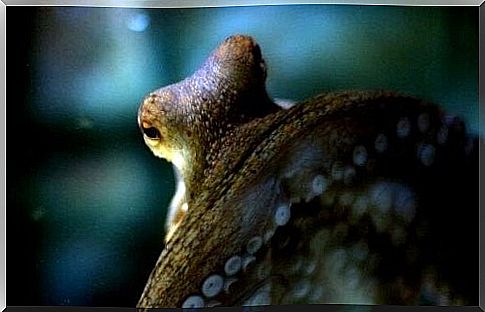The Intelligence Of Octopus: A Fascinating Mystery

The intelligence of octopus is a topic that is increasingly attracting the attention of scientists. These creatures, halfway between an ocean alien and a brain with suckers, have an amazing mind. You should know that the 500 million neurons that these cephalopods have are in their tentacles. Thanks to them, they explore, feel and make decisions.
Those who work in aquariums or oceanographers know that octopuses are the animals that bring the most problems. All of those responsible for these facilities tell fascinating stories of how these animals find ways to escape or break into other aquariums to steal food from other marine life. Yes, they are fascinating.
For many scientists, on the other hand, the unusual intelligence of cephalopods is nothing out of the ordinary. Some say that all of these skills respond to simple ecological intelligence. In other words, animals develop certain strategies according to the demands of the environment. Therefore, octopuses would be nothing more than beings who manage to find food anywhere.
In spite of everything, there is one particularly astonishing data. Piero Amodio, a scientist at the University of Padua, Italy, recorded a video that quickly went viral. In the latter, we see an octopus doing all it can to grab a shell and get into it. A little later, the animal wins because it knows that it is a “tool” and that it can be of use to it. Below we clearly see an example of planning.
The intelligence of octopus: characteristics and mysteries
Cephalopods had a shell on their backs over 275 million years ago. It served them to defend themselves from predators, but also represented a disadvantage: it slowed down their search for food. Breaking free from this element allowed them to explore their surroundings with more freedom, to enter narrower holes, to gain power to break seashells, rocks and also to hunt with greater precision.
However, not having shells left them also made them vulnerable. This is why they have become more ingenious and have started looking for “substitutes” in order to be able to protect themselves. But the intelligence of octopuses goes far beyond this simple fact. One of the foremost experts on the subject is Peter Godfrey-Smith, an Australian philosopher who is in constant contact with these creatures. Its objective is to explore the origin of consciousness through cephalopods.
So, The Octopus, the Sea and the Deep Origins of Consciousness is a very astonishing work that is worth reading to better understand these beings and, at the same time, a part of ourselves. In this book, Godfrey-Smith tells us about his encounter with a gigantic cuttlefish in Australia. This animal, instead of being afraid of it, observed it and approached it to “stroke” it with immense curiosity. This delicate contact marked him forever.
Octopuses change their own genetic code
This data is surprising. Eli Eisenberg, a scientist at Tel Aviv University, carried out a study on the intelligence of octopus to find that these animals are able to “manipulate” their own genetic code.
Cephalopods “improve” their nervous system according to the climatic demands of the environment. Their organisms carry out ribonucleic acid (RNA) recombination: they thus send new proteins to genes to improve their adaptation. It is something that humans manage to do gradually and slowly through evolution, but octopuses do it according to their needs.
The same amount of neurons as our dogs
Octopuses have around 500 million neurons, just like dogs. However, the nervous system of cephalopods is distributed in their tentacles. They therefore have 9 brains: a central brain and eight peripheral brains.
The tentacles are therefore an indispensable part of the intelligence of octopuses. Thanks to them, they can explore, smell, savor and even make decisions. Each tentacle can make a specific decision, separate from the others. However, they all work in harmony and without disagreements.

They communicate, play and are creative
Biologists have discovered that some squids communicate with each other through a system that resembles Morse code. On the other hand, those who are used to observing the behavior of octopuses know that they are extremely creative.
They build their own hiding places, are able to creatively solve problems, face challenges, open crates, hunt in original ways, and behave similarly to humans.
When in a location they don’t like, they are able to throw water jets at their healers as soon as they see them. They develop manias and also passions. They have fetish objects and others that disgust them. In this case, they do not hesitate to destroy them. Finally, they are cunning and develop an attachment for some healers. Others are only entitled to hatred.
To conclude, as philosopher Peter Godfrey-Smith points out, immersing yourself in the intelligence of octopuses also means immersing yourself in our own consciousness. The spirit, in the end, arose out of the sea; the origin of all life is from the oceanic world and, therefore, looking at the eyes of a cephalopod means being aware of the fact that we share a story with it.










